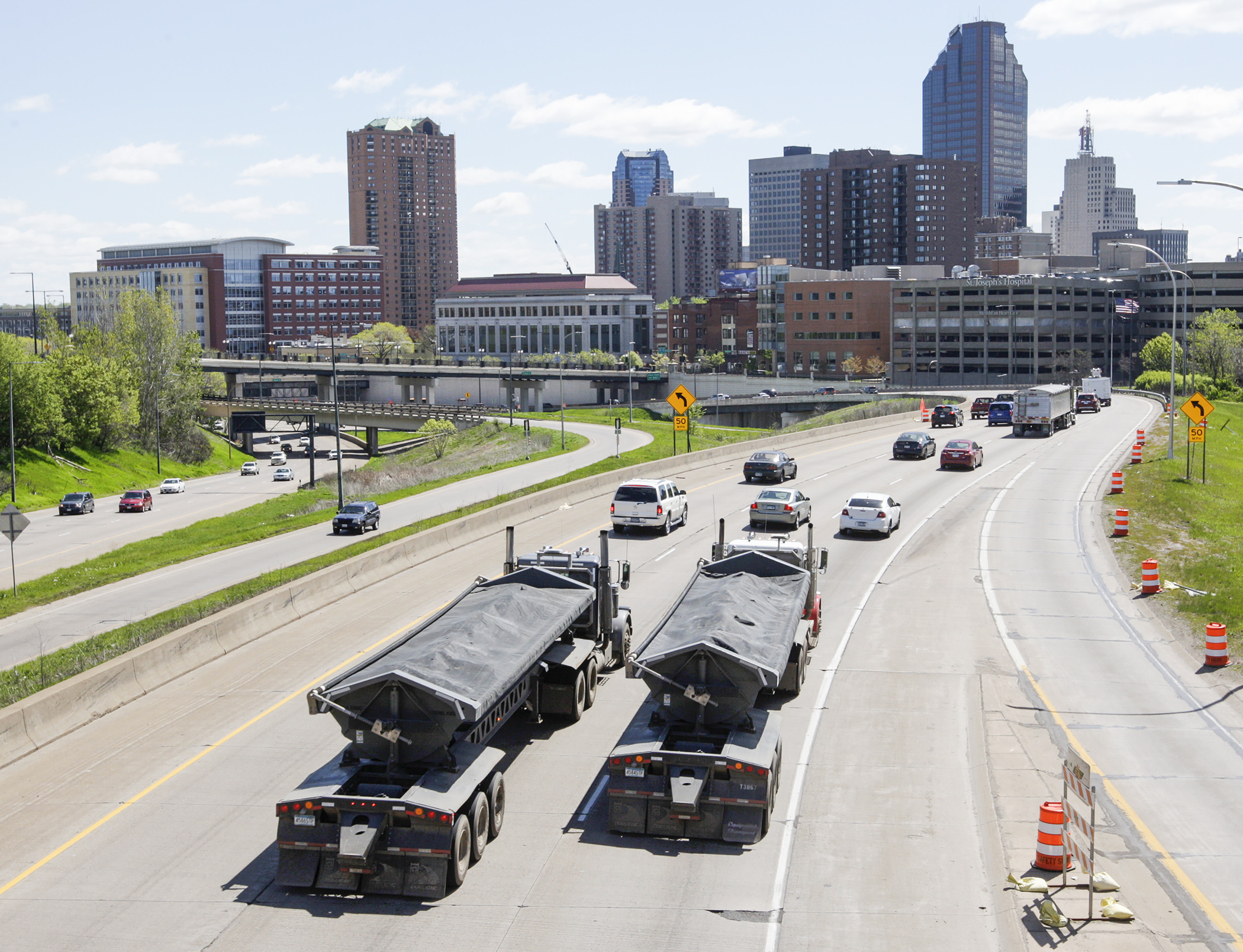Amended omnibus transportation bill approved along party lines

Agreement about the need for infrastructure improvements and arguments about how to pay for them continued Thursday before the House Transportation Finance and Policy Committee approved its omnibus transportation finance bill after three days of hearings.
Members first adopted the delete-all amendment to HF1684, then voted 10-7 along party lines to approve the bill and refer it to the House Taxes Committee, where it is scheduled to be heard Friday. A companion, SF1159 sponsored by Sen. Scott Newman (R-Hutchinson), was approved Thursday by the Senate Transportation Finance and Policy Committee.
The omnibus bill includes an extensive package of infrastructure investments, policy provisions and some tax increases, although fewer than when initially introduced as members spent the afternoon debating and voting on nearly 20 amendments.
Under the bill, the Department of Transportation would receive $6.25 billion, the Department of Public Safety $491.39 million, and the Metropolitan Council $178.81 million.
There is also $400 million in trunk highway bonding is also proposed in fiscal year 2024: $225 million would go to state road construction and $175 million to the Corridors of Commerce program.
The bill would result in a $39.6 million increase in General Fund spending over the current base level.
[MORE: View the spreadsheet and tax proposals]
“We cannot continue to pass transportation bills that just keep us limping along one year after the next,” said Rep. Frank Hornstein (DFL-Mpls), the bill sponsor. “…We need new, dedicated, reliable resources for transportation.”
Rep. John Petersburg (R-Waseca) said he is concerned about tax increases proposed in the bill, especially with a projected budget surplus and federal money expected.
“I do think we are going to have to struggle and spend a great deal of time talking about where the funding mechanisms are going to have to be in the future,” Petersburg said. “That’s not going to be easy.”
Amendments adopted
The committee adopted several amendments, including one that removed a controversial tax increase – a 4% “luxury vehicle surcharge” to the motor vehicle sales tax – that would have been levied on vehicle purchases more the double the annual average sales price of vehicles in three classifications.
Hornstein said he’d taken criticism that the proposal might be tough to implement as currently worded to heart and agreed it needed more work.
“Important questions were raised, and I’m listening,” Hornstein said.
Another Hornstein amendment that made largely technical and conforming changes to the bill was adopted, as was one from Rep. Steve Elkins (DFL-Bloomington) that would require deputy registrars to make an application before placing a self-service kiosk to renew vehicle registrations, which a provision in the bill would permit them to begin doing. The application process would avoid “turf wars,” Elkins said.
Failed amendments
Attempts to remove some other tax proposals from the bill were not as successful.
An amendment from Rep. Cal Bahr (R-East Bethel) to remove a provision that would direct the Department of Revenue to index the motor fuels tax to inflation using the National Highway Construction Cost Index failed on a 10-7 party-line vote.
Bahr said he does not disagree that money is needed for transportation, or even that the gas tax may have to increase from time to time. His objection is that it would automatically rise with inflation.
“I don’t think it should be on autopilot,” Bahr said.
Hornstein called the gas tax the “workhorse” of funding for the transportation system and said the increase would amount to about a penny per year.
“It is simply common sense,” Hornstein said. “Construction costs are increasing, roads are deteriorating … We can pay now or pay a lot more later.”
An amendment offered by Rep. Jon Koznick (R-Lakeville) that would require local voters to approve sales tax increases, such as the 0.5% increase to the transit sales tax in the Twin Cities metropolitan area proposed in the bill, was also defeated 10-7 along party lines.
Some of the other highest profile funding and policy proposals include:
- allowing people without proof of legal presence in the U.S. to obtain driver’s licenses or Minnesota identification cards;
- $6.2 million for a grant to ReConnect Rondo to develop the project that would create a land bridge over Interstate 94 in St. Paul from Lexington Avenue to Rice Street;
- $2.5 million for design and construction to provide a second daily Amtrak train running between the Twin Cities and Chicago;
- establishing a statewide goal to reduce vehicle miles driven by 20% by the year 2050;
- requiring the Metropolitan Council to plan for the goal of having its entire transit fleet using zero-emissions vehicles by 2040;
- directing development of a pilot program to increase work zone safety using automated traffic enforcement systems; and
- ending driver’s license suspensions for a number of different violations, including unpaid traffic tickets, and reducing barriers to license reinstatement.
Related Articles
Search Session Daily
Advanced Search OptionsPriority Dailies
Speaker Emerita Melissa Hortman, husband killed in attack
By HPIS Staff House Speaker Emerita Melissa Hortman (DFL-Brooklyn Park) and her husband, Mark, were fatally shot in their home early Saturday morning.
Gov. Tim Walz announced the news dur...
House Speaker Emerita Melissa Hortman (DFL-Brooklyn Park) and her husband, Mark, were fatally shot in their home early Saturday morning.
Gov. Tim Walz announced the news dur...
Lawmakers deliver budget bills to governor's desk in one-day special session
By Mike Cook About that talk of needing all 21 hours left in a legislative day to complete a special session?
House members were more than up to the challenge Monday. Beginning at 10 a.m...
About that talk of needing all 21 hours left in a legislative day to complete a special session?
House members were more than up to the challenge Monday. Beginning at 10 a.m...